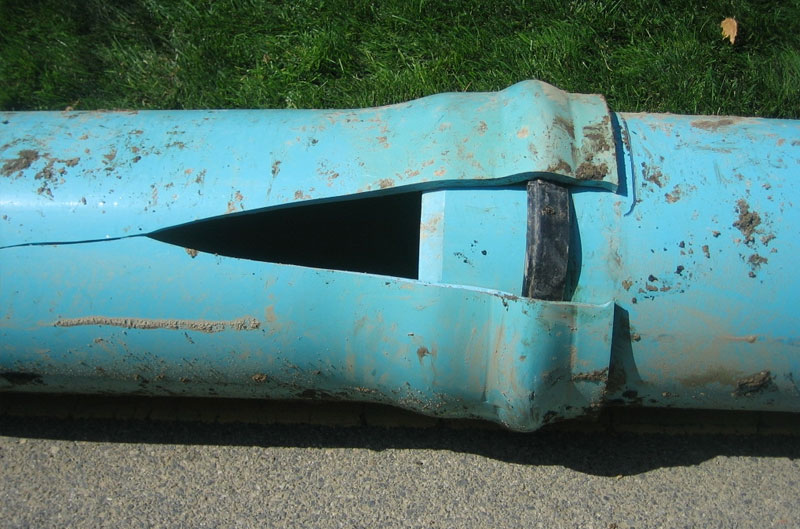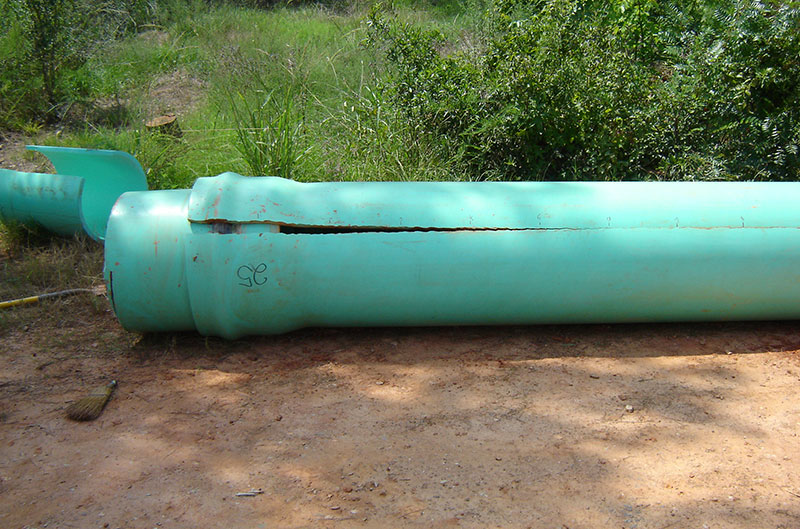Can your plastic pipe fittings handle the pressure?
Polyvinyl chloride (PVC) piping is the highest volume of all plastic piping products. Rigid PVC pipes are highly ductile when properly manufactured. Their long-term service life of PVC pipe has been determined to be more than 50 years.
PVC pipes are generally ductile when exposed to long-term stress, but their inherent toughness is rate-dependent.
They can undergo catastrophic failure if exposed to high-speed stress events. Therefore, forensic failure analysis studies should include tests to investigate which of these factors contributed to the cause of failure.
There is occasional an brittle failure of PVC pipes and fittings. PVC pipes occasionally fail due several reasons including:
- Defective pipe manufacture – The main manufacturing defects that cause PVC pipes to fail include incomplete resin fusion, incomplete fusion of extrusion knit lines (also called “weld lines” or “spider-lines”), and inhomogeneity of the filler content
- Defective installation – The main installation errors are over-belling and improper soil conditions.
- Defective operation – The main operational defects include over-pressurization due to water-hammer and liquid column separation due to improper pipeline venting.
What is C900 PVC pipe?
C900 is the American Water Works Association (AWWA) standard for cast-iron-pipe-equivalent outside diameter PVC pressure pipe and fabricated fittings covering nominal pipe sizes from 4 inches through 12 inches. C900 pipes and fittings must comply with the Safe Drinking Water Act requirements, meaning for potable water transmission and distribution. The C900 standard does not include injection-molded PVC fittings.
Examples of different causes of PVC pipe failure
1. Incompletely fused extrusion knit Line

PVC pipes are manufactured by an extrusion process. PVC powder is melted and forced through a circular die under high pressure. The center of the die-face is a solid metal plug held in place by thin metal webs or vanes. The vanes slice the melted plastic as it flows through the circular slits in the die. The plastic then fuses back together to form a solid pipe wall.
Occasionally, the knitting process doesn’t take place completely, producing what are called “weak extrusion knit-lines.” Therefore, it’s common for pipes to fail with a straight longitudinal split running down the full length of the pipe because it follows the path of least resistance, which is an imperfect knit-line.
When a pipe fractures at a knit line, the fractured pipe will curl up on itself with the two fracture surfaces overlapping each other. This indicates that the pipe was manufactured with high residual stresses in the wall of the pipe. Pipes manufactured with high residual stresses are much more likely to fail than pipes with low residual stress.
2. Defective installation

Most large diameter PVC pipe joints are bell/spigot. The bell contains a rubber gasket that seals against the inserted spigot end of the pipe. Insertion of the spigot end of one pipe into the bell end of an adjacent pipe is an extremely delicate process and must be done properly or failure is likely.
“Over-belling” is the most common installation defect that leads to PVC pipe failure. If the spigot is inserted too far, it makes direct contact with the PVC bell, causing the bell to split as shown in the image above. Our forensic PVC experts can determine if defective installation caused the failure.

“Our highly experienced forensic scientists can conclusively determine if a PVC pipe failure occurred because of the defective knit line using optical microscopy.”
Dr. Duane Priddy, Plastic Expert Group, Founder & CEOForensic PVC failure analysis process
A typical PVC pipe failure analysis involves:
- Analysis of the pipe for manufacturing defects including ASTM D2122 and ISO18373-2 for the degree of fusion and ISO18373-1 for processing temperature.
- Analysis of the pipe for installation defects including evidence of over-belling.
- Analysis of the pipe material to determine if it meets the ASTM minimum cell class tensile, stiffness and impact strength requirements.
- Analysis of the fracture surface for failure mode and crack origin.
